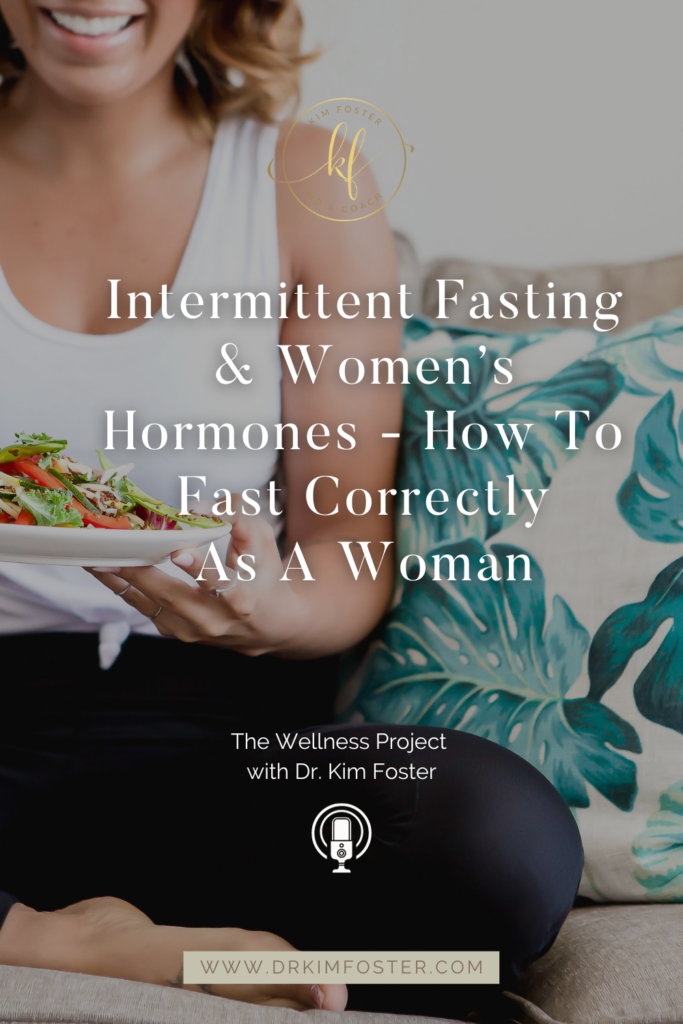There has been a lot of talk lately about intermittent fasting and women’s hormones.
You may have heard that IF could mess up your hormones or that you need to do it in a highly complex way to make it work.
So, is this true?
While intermittent fasting is highly beneficial for both genders, we need to approach it differently as women.
But that doesn’t mean it has to be complicated.
In this week’s article and YouTube episode, I’m addressing the concerns and rumors around IF and women’s hormones.
I’ll explain why, as women, we may need to approach fasting differently and how to ensure you get the best results.
Intermittent Fasting: Gender Differences
As you know, men and women have very different physiological differences, so naturally, IF may affect both genders differently.
While the difference in body composition and nutritional requirements play vital roles, hormones are the most significant variance.
Think about it…
Menstruating women have much higher hormonal fluctuations throughout the month than men. These hormonal fluctuations can result in changes in energy levels, appetite, and mood, and thus, our menstrual cycle can impact how we respond to fasting.
Now, this is not the case for every woman, as when it comes to menstrual cycles, we’re all different.
Our cycles and menstrual symptoms can vary significantly. They can be regular or irregular, heavy or light, painful or painless. Some women are highly susceptible to hormonal fluctuations, while others barely notice them.
So, the advice I’m giving (as well as other advice you find online) is NOT one-size-fits-all. Pay attention to YOUR body, and experiment to find what works for YOU.
Can Intermittent Fasting Help To Balance Hormones?
Studies are beginning to suggest that intermittent fasting may help regulate hormone balance in women.
One reason is that IF can improve insulin resistance and reduce body fat, which can help women with polycystic ovary syndrome (PCOS) better manage their symptoms. Studies have also found that the 16:8 time-restricted fasting method can decrease levels of androgens, like testosterone.
Other Benefits Of Fasting For Women
- Weight Management – Research shows that IF can promote weight and fat loss in both men and women.
- Insulin Sensitivity – Fasting can improve insulin sensitivity, which improves blood sugar control and metabolism
- Longevity – Studies have found that intermittent fasting could extend our lifespan by slowing the aging of cells and reducing the risk of developing age-related diseases.
How To Make Fasting Work For You
While IF can certainly benefit women, it’s essential to approach it mindfully, adapting it to suit your individual needs.
Before starting IF, pay attention to YOUR menstrual cycle and the way you feel throughout the month, especially during the following two phases:
- Luteal phase
- Follicular phase
Luteal phase
If you have a regular 28-day cycle, the luteal phase starts two weeks before your period starts and lasts until the first day of your period.
For some women, this phase can be eventful in terms of physical and emotional symptoms. Your energy levels can plummet, your mood can be up and down, and you might experience lots of food cravings or an increased appetite.
If this is your experience, you might benefit from easing your fasting restrictions during this time. For example, if you usually do a 16-8 schedule (16 hours of fasting and 8 hours of eating), shift to a 14/10 or 12/12 schedule instead.
How long you will need to ease the restrictions depends on the length and severity of your premenstrual symptoms. Some women find they need to follow the 12/12 for the entire two weeks before their period, while others just shift to this schedule for a few days.
Of course, as our premenstrual symptoms can change month by month, how you adapt your fasting schedule may also look different each month.
Also, not every woman experiences premenstrual symptoms. For example, the luteal phase is pretty uneventful for me, so I don’t feel the need to adjust my fasting schedule much during this time.
Follicular phase
The follicular phase starts from the beginning of your period and lasts around two weeks while your body prepares for its next ovulation.
Some women find their energy levels and mood rapidly increase during this time, their cravings subside, and they can better manage their emotions.
Therefore, this is often an ideal time to follow the 16-8 schedule and even consider longer fasts.
However, again, this is only the experience for some. If, like me, you don’t notice a massive shift in your energy levels between the follicular and luteal phases, then you can follow a fairly consistent fasting schedule throughout the month.
To learn more about this, watch the full YouTube video here:
If you prefer an audio-only version, here’s where you can listen to the podcast episode:
Final Thoughts
The key takeaway here is to listen to YOUR body and adjust your IF method based on what you feel your body needs throughout the month. If you lack energy and need to eat more in the week before your period, don’t be afraid to take a break from IF or switch to a shorter fasting period.
If you’re starting intermittent fasting for the first time, ease into it slowly. Start with the 12/12 method, which is 12 hours of fasting overnight and 12 hours of eating during the day. Then, gradually increase your fasting window as your body adapts.
For more advice, download my free guide with 10 tips for getting started with Intermittent Fasting.
And I’d love to know…
How does your menstrual cycle affect your IF experience? Do you need to eat more regularly due to increased hunger or lack of energy during the luteal phase?
Let me in the comments below or find me on Instagram and send me a DM!
Resources Mentioned:
Download my free Intermittent Fasting Guide: https://drkimfoster.com/fasting
Apply for the Wellness Coach Academy today: https://wellnesscoachacademy.com
More Helpful Resources:
- Apply for the Wellness Coach Academy today: https://wellnesscoachacademy.com
- My Free Class: How To Build A 6-Figure Health Coaching Business Using One Signature Program
- Kim on Instagram: https://www.instagram.com/drkimfoster/

FREE CLASS!
Looking to take your wellness journey to the next level?
The 3 Secrets For Stepping Into A Meaningful New Career Without Wasting Time Or Money
- find out why health & wellness coaching is a skyrocketing industry that can provide the freedom and fulfillment you’ve been craving
- discover the 3 biggest myths about health & wellness coaching that will hold you back (and what the truth is instead)
- learn the secret sauce for getting amazing results for your clients (and building a profitable business as a wellness coach)
…and more!

Subscribe to my Podcast:






